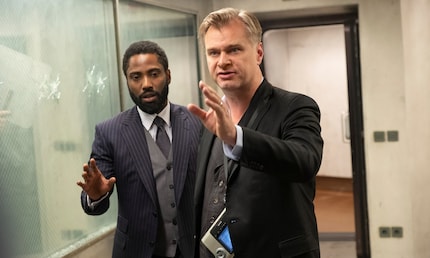
Review
«Bullet Train»: the sickest trip of the year
by Luca Fontana
Christopher Nolan is a strange creature: «Tenet» attempts to combine intellectual arthouse films with Hollywood's brute blockbuster cinema. And it works.
One thing in advance: there are no spoilers in this review. I’m not going to talk about anything that isn’t mentioned in the trailers.
The future is dangerous. It's attacking its own past – in the form of a mysterious weapon that could wipe out the world and its entire space-time structure. Why would the future do this? We don't know. Nevertheless, the weapon falls into the hands of Russian billionaire and arms dealer Andrei Sator (Kenneth Branagh). He's apparently willing to use it to end all life on earth.
To track down Sator and prevent the weapon from being used, an American spy (John David Washington) is recruited by the enigmatic secret service «Tenet». He sets off on a hunt halfway around the globe – through Mumbai, Tallinn, Pompeii and London. On this journey, he breaks seemingly insurmountable physical laws by changing the flow of natural time itself.
A word that means the same read forwards and backwards. A palindrome. «Tenet». At least at first glance. At a second look, you'll recognise how «Tenet» is Christopher Nolan's spectacular attempt to fuse James Bond's spy action thriller with science fiction.
And «spectacular» is exactly the right word. The film is spectacular in just about every way. Spectacularly large. Spectacularly ambitious. Spectacularly... complicated. Not only in a visual way by showing time currents, but also in its complexity, which constantly throws you for a loop.
I remember how the dreams in «Inception» gave me a headache: Nolan loves to throw puzzle pieces at the audience, having them put them together themselves. A compliment, if you see it that way. He doesn't think we're stupid. He entrusts us with the ability to handle complex subjects. But «Tenet» is really going for it. It plays with concepts that the human mind is hardly able to comprehend. Such as «inverted entropy». Reversing the natural decay of all matter.
In other words, objects that travel backwards through a normal time stream. Bullets, for example. Or cars. Sounds complicated? Yeah, it is.

So far so Nolan. No other director dares to combine such intellectual stunts with modern Hollywood blockbuster cinema. It's what makes him unique. It's what makes him so desirable. His films are intoxicating. This goes double for «Tenet». Especially in its visual impact, being both confusing and euphoric at the same time. Like when a building explodes simultaneously forwards and backwards, for example. Or when pistol bullets won't leave a barrel, getting stuck in it. Instead, they smash through everything and everyone that has – well, would've – got in the way. Or something like that.
But this is only the tip of the iceberg. Nolan has more ammo. Such as the possibility of alternate realities. Paradoxes. Theories about the immutability or non-immutability of one's own past. Yes, the director who also wrote the screenplay sometimes pushes scientific concepts to the limit. But that's Nolan. One of Hollywood's last auteur filmmakers, who only films what he has written himself. Nevertheless, big studios seemingly blindly entrust him with millions of dollars.
He can even push through a theatrical release in the middle of a pandemic.

«Don't try to understand. Feel». This is said by the scientist Laura, played by Clémence Poésy, who introduces the protagonist to the world of Tenet. It might as well be Nolan speaking directly to the audience, encouraging them not to question too much.
One thing to note: «Tenet» might be Nolan's weakest movie so far in terms of characterisation. His characters are present, living off the undoubted charisma of their actors. But they rarely seem like real people for nearly 150 minutes – or two and a half hours. Significantly, John David Washington's character is actually only mentioned in the credits as «the protagonist».
We're far removed from Dominick Cobbs' (Leonardo DiCaprio) loss and pain in «Inception». Or Bruce Wayne's (Christian Bale) repentant path to self-discovery in «Batman Begins». And «Tenet» doesn't even begin to approach Cooper's (Matthew McConaughey) emotional gravitas. The story of a father who abandons his family for the vague possibility of saving the human race.
This is probably due to the genre. «Tenet» is first and foremost an espionage thriller. Clichés are deliberately used. Exploiting stereotypes. This saves valuable time, which would have to be filled by explanations and biographies. The protagonist? He's your typical altruistic hero who risks his own life to save the world. The villain? Russian. Aka. a cold merciless brick wall. The smart guys? Mostly Indian. Or Robert Pattinson. By the way, he gives the best performance of the movie.

In «Tenet» at least, characters adapt to the plot. They fulfil their function. For example, they provide the protagonist with important information. At the right moment, of course. Not a second earlier. Then they disappear again. Emotional weight survives solely off the charisma of the actors, never off the script. Some parts work. Others don't really impact the viewer.
By Nolan's standards, this is decidedly unusual.
Still, a masterpiece remains. A visual masterpiece that must be seen in cinemas, at the very least. Preferably in an IMAX cinema. After all, Nolan shot on 70mm and in IMAX format. It's almost as if he and his regular cameraman Hoyte Van Hoytema are trying to fight the slow drift of big pictures into the streaming world with all means.
Van Hoytema – a man of big pictures who also captured «Interstellar» and «Dunkirk».

The pictures also appear grandiose because Nolan still successfully resists the excessive use of computer effects. If, for example, a cargo plane crashes into the atrium of an airport, then it is a real Boeing. Sure, why not? This keeps the audience questioning how the hell they managed that. With the magic of cinema, of course.
The fact that characters sometimes seem hollow and the plot overloaded doesn't detract from this refreshing cinematic experience. Quite the opposite. Yeah, «Tenet» can be deceptive. And the plot itself is almost incidental. A sentence like that one could seem like a death sentence. Not with Nolan. «Tenet» may not be his best work. Nevertheless, I'd like to rewatch the movie, naively hoping to figure out the logic that breaks seemingly insurmountable laws.
An impossible endeavour.
I write about technology as if it were cinema, and about films as if they were real life. Between bits and blockbusters, I’m after stories that move people, not just generate clicks. And yes – sometimes I listen to film scores louder than I probably should.
Which films, shows, books, games or board games are genuinely great? Recommendations from our personal experience.
Show all